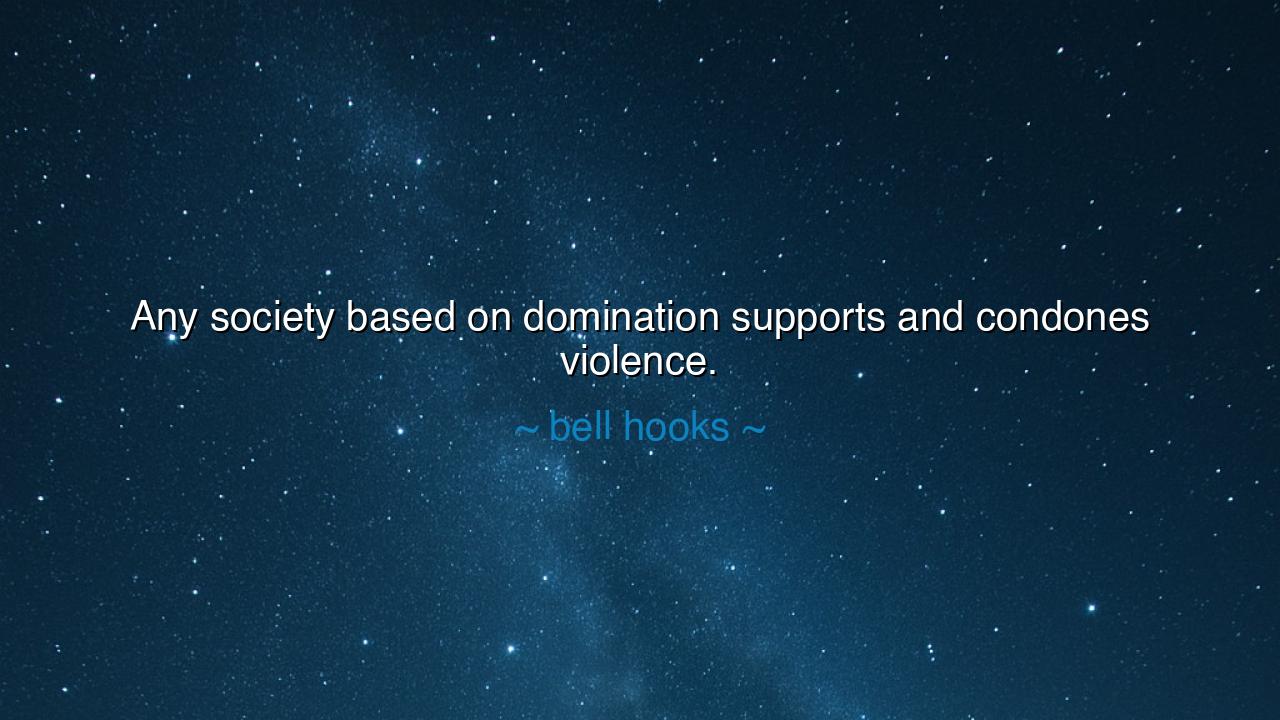
Any society based on domination supports and condones violence.






Hear the words of bell hooks, the fierce teacher of love and justice, who declared: “Any society based on domination supports and condones violence.” These are not the idle musings of a scholar but the thunder of one who gazed into the heart of oppression and named its root. She reminds us that violence is not born in the shadows by chance—it is nourished wherever power rests upon the necks of the powerless. When a people are divided into rulers and ruled, masters and servants, strong and weak, then violence becomes not exception but law, not accident but foundation.
The ancients, too, knew this bitter truth. Did not the Pharaohs of Egypt command the lash to build their monuments, their rule sustained by whips upon the backs of slaves? Did not Rome’s empire thrive on conquest, its arenas soaked in blood to remind citizens that power is purchased through pain? These were mighty civilizations, yet their greatness was stained, for their societies were rooted in domination. And where domination lives, violence is not condemned, but sanctified as the price of order.
Consider the long shadow of slavery in the Americas. It was not merely an economic system—it was a structure of domination, justifying itself with lies of race and superiority. Violence was not a hidden shame but an everyday instrument: the chain, the whip, the auction block, the separation of families. Those in power condoned it, defended it, and wrote it into law. Here the truth of hooks’ words blazes clear: when domination is the foundation, violence is not only tolerated—it becomes inevitable.
And history repeats in patriarchy, where men placed themselves as rulers over women, enforcing submission not only with laws but with silence, with force, with intimidation. In such a society, violence against women was long ignored, minimized, or excused, for domination taught that the powerful had the right to control the powerless. Even in the most intimate spaces, violence grew because the soil of domination nourished it. Thus, bell hooks warns us that structures built on inequality are complicit in cruelty, even when they cloak themselves in tradition or respectability.
O seeker of truth, let this pierce your heart: a culture that sanctifies domination cannot escape violence. It may polish its monuments, sing of its greatness, or boast of its wealth, but beneath the surface lies the rot of coercion. Peace cannot grow where one class, one race, one gender, or one people stands upon the neck of another. To condone domination is to plant seeds of conflict that will one day rise as war, rebellion, and endless suffering.
Let your spirit then be vigilant and brave. Do not be deceived into thinking domination is strength—it is weakness disguised, for it needs violence to uphold it. True strength lies in justice, in mutual respect, in the recognition of each soul’s worth. A society that seeks peace must uproot the habits of domination wherever they are found—in homes, in workplaces, in nations. Only then will violence cease to be its unspoken law.
In practice, begin where you stand. Challenge systems that exalt power over compassion. Speak against racism, against patriarchy, against class domination, against every structure that feeds inequality. Do not turn away when you see violence excused or justified; to remain silent is to condone it. Build instead communities of cooperation, where power is shared, and dignity is honored.
So I say unto you: heed the words of bell hooks. Any society that rests on domination will reap the harvest of violence. But a society built on equality, on justice, and on love will bear the fruit of peace. Choose this path, and you will not only transform your world—you will leave behind a legacy worthy of the generations to come.






AAdministratorAdministrator
Welcome, honored guests. Please leave a comment, we will respond soon